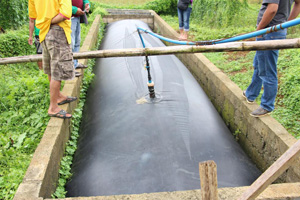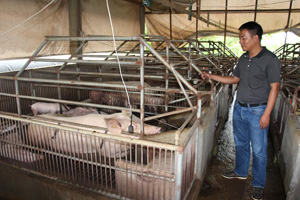

The evident change in temperature is one of the signs of climate change. Human activities such as cutting and burning of trees contribute to increasing atmospheric concentrations of carbon dioxide and other greenhouse gases (GHG).
Most of the people would give seemingly acceptable reasons since energy is needed for survival. Many businesses need much of this and the demand has been increasing over time. There is a need to reduce non-renewable energy application and convert the use of fossil fuels to renewable energy for cooking and lighting.
To help mitigate its impact among farmers, particularly in the livestock sector, the Department of Agriculture has introduced the utilization of wastes through the use of biogas technology using the polyethylene digester.
Biogas helps improve environmental condition by reducing application of chemical fertilizers, promoting efficient waste management and it is used as clean energy by utilizing the commonly-abandoned farming wastes.
Practicing the use of biogas not only mitigate climate change but also a means for livelihood. Targeting primarily the farming families, the practice promotes biogas not just as domestic energy but also as new income or cost reduction source.
There is Money in Waste Management Barobo swine raiser Romana Suan has proven the many benefits of biogas by utilizing the animal dung taken from her piggery.
Suan is an active member and treasurer of Barobo Swine Raisers Association and has been raising swine for more than seven years. “When I started raising pigs, many of my neighbors and passers of our vicinity complained because of the unpleasant smell from my backyard; but since I started using biogas, stinkiness subsides,” said Suan.
After learning the technology through the lectures and trainings conducted by the Department of Agriculture–13 and Municipal Agriculture Office of Barobo, Suan decided to build the system with the provision of facilities such as the polyethylene digester and technical assistance from the Department and the Bureau of Animal Industry.
“Ms. Suan has been an example to other swine raisers in the municipality, her adaptation from all the things she learned has been an encouragement to us,” said Agricultural Technician Cherry Diaz.
Not just in a business of selling pigs, Suan also has a cafeteria where she largely benefits the use of produced flammable gas (mostly methane) for cooking. “I do not need to buy two tanks of gas per month for my business which is equivalent to around P 1,600. This amount that I can save would allow me to buy other things for my business,” she said.
The biogas discharge or its by-product has also been utilized as organic fertilizer in her five hectares of various high value crops. These benefits from the use of biogas make her save money and gain more profit.
“I am thankful that I have personally experienced the many benefits of biogas. God has blessed me in such a way that my children are working with me for the progress of the business and they have decided to follow my footsteps; something that a mother could be proud of,” Suan said. (Fretcher D. Magatao, DA-13)






